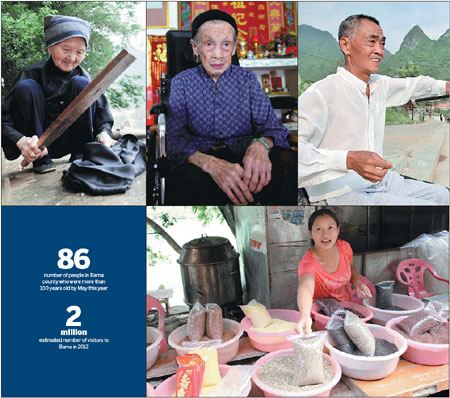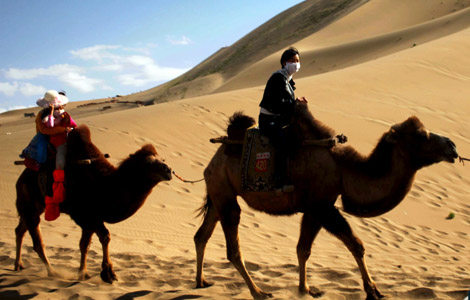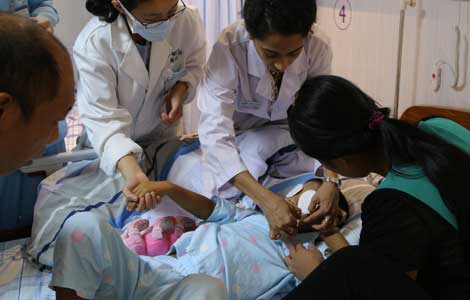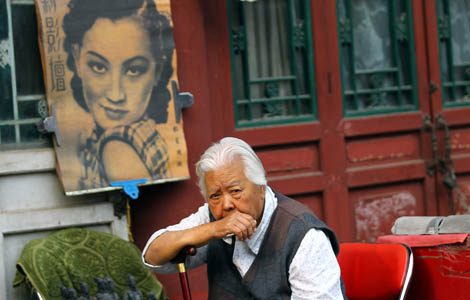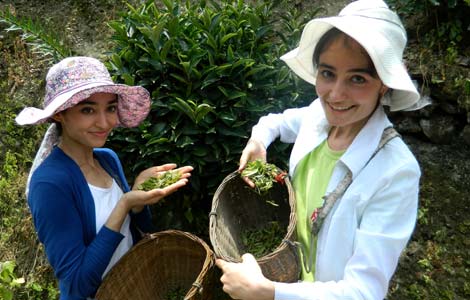A county for the ages
Updated: 2013-09-04 07:30
By Li Yang (China Daily)
|
||||||||
|
Clockwise: Huang Makang, 107 and 110-year-old Huang Masongmou, live in Longevity village in Bama county, Guangxi Zhuang autonomous region; Ouyang Yuanming, 60, a retired worker from Guizhou province, has lived in Bama with his wife for three years; Local resident, Huang Lilin, sells beans, corn, millet, mushrooms and hemp in Longevity village. Photos by Huo Yan / China Daily |
|
People like to drink the spring water from Baimo cave in Bama. Huo yan / China Daily |
Subtropical region is known as the 'home of longevity', reports Li Yang in Bama, the Guangxi Zhuang autonomous region.
'A man in his 90s sobbed at the door of an old adobe house. He grumbled that he had so much farm work to do every day, but his mother still assigned him new tasks, such as helping his grandmother chop firewood and cook supper. When asked where his mother was, the old man pointed to the mountains and said: 'She's cutting pigweed somewhere in the valley'."
That joke is often told in Bama Yao autonomous county in the Guangxi Zhuang autonomous region. The county, which was designated a global "home of longevity" by the International Natural Medicine Association in 1991, covers 1,971 square kilometers and is home to 270,000 people.
Bama is exceptional among high-latitude areas noted for longevity. The 1964 national census recorded 28 people in the county aged 100 or older. By May this year, 86 were more than a century old.
In many Chinese villages, it's customary to make a coffin when a resident reaches the age of 60, but Bama's centenarians have seen a series of coffins rot away. "Generally, the fifth coffin is the one we will lie in forever," joked one villager.
Bama is the only world-famous longevity home in a subtropical region. While other long-life hot spots, such as the Caucasus mountains, southern Xinjiang in China, Pakistan and Ecuador, all share features such as an abundance of fresh water and unpolluted air, Bama has an added ingredient.
The county is situated on a deep fault line that cuts directly into the earth's mantle and the resultant strong terrestrial magnetism helps maintain a high number of negative ions in the air, ranging from 2,000 to 5,000 ions per cubic centimeter, helped by the primeval forests and abundant rainfall.
The Panyang River flows east to west along the fault line. The mountains on the river's north bank are covered by a thick layer of soil, while a range of limestone hills stretches away to the south.
Influenced by terrestrial magnetism, Bama's spring and river water is restructured into micro-clusters, which some scientists believe promote cell regeneration.
"Almost all the micro-elements in the water and earth in Bama are the most important for the human body, while those the body doesn't require, such as heavy metals, are found in very low proportions," said Peng Yingao, a geriatrician at Xinjiang University.
Research suggests that the local houses, built with rammed bricks made of local stone, mud and wood, also help to promote longevity because of the beneficial effects of low-level radiation emitted by the rocks. Scientists say the local conditions help to strengthen resistance to disease, regulate the metabolic rate, alleviate bronchial asthma and stabilize blood pressure.
The local diet is healthy, too. It includes corn, rice, millet, sweet potato, soybean, snailflower beans and green soybeans, pumpkin stems, sweet potato leaves, pak choi, mushrooms, pork, goat, chicken and duck.
The 'bird people'
However, things are changing. In recent years, tens of thousands of "migratory bird people" have arrived to take advantage of the environment. Most have chronic diseases or cancer.
"The bird people will never have the same lifestyle as the locals, because they are ruining it", complained Liang Shao'en, a local civil servant.
The streets are full of ads for longevity-related products and restaurant menus emphasize the life-prolonging effects of the local diet.
About 2 million people visited Bama in 2012, accounting for 48 percent of its GDP. Take Poyue village: The local population of 400 has been swamped by the bird people, whose numbers have swollen from 1,500 in 2004 to 20,000 at present.
Work on Bama's only sewage treatment facility will not be finished for several years, so all the domestic wastewater ends up in the Panyang River, the main water source for locals. Contaminated water from a nonferrous metal mine in Fengshan county, on the upper reaches of the river, has leeched into the water supply and the quality has deteriorated.
The villagers have not drunk river water for at least five years, preferring to use mountain springs instead.
Changshou, or "Longevity", village has a population of 500 and is situated near a water source called Dragon Spring. However, the source pool dried up after locals set up a series of plastic pipes and a water pump to deliver water directly to the inns where the bird people reside.
At first, the incomers rented the villagers' houses, but now they offer them money to build houses on their land, reshaping the village with iron, steel and cement.
Two malodorous garbage dumps dominate the landscape at the foot of a mountain close to Baimo cave, a local tourist spot.
"We haven't enough manpower to carry the refuse away", admitted Liang. "Before the bird people came, the village garbage was biodegradable and was put into septic tanks."
Thousands of bird people, in pajamas, shorts, vests, in armchairs and on crutches, flock together in front of the cave every evening. Each carries a plastic bottle.
Some sit dazed, some walk and clap their hands as a keep-fit exercise and some dance. No matter, they all keep their eyes firmly fixed on the cave, which appears to them as the source of a magic elixir.
Two cancer patients, a man in his 60s from Shenzhen, Guangdong province, and a woman in her 50s from Jiangxi province, were breathing the air in the cave. The man said: "I will live here till I die." The woman replied, "So will I. I can't afford to go to the hospital at home."
Zeng Xingmin, 53, and her husband have lived in Longevity village for three years, "My husband is an alcoholic and has hypertension. His blood pressure returned to normal after we stayed here for three months. My diabetes is also alleviated. I don't need to take artificial insulin here," said Zeng.
She persuaded her former neighbor, Yang Yuanming, a retired grammar school teacher from Luodian county, Guizhou province, to relocate to Bama. "My physical condition is very poor. But I feel comfortable and energetic here. The terrestrial magnetism casts a spell over the water and air", said Yang. She and Zeng drink eight bottles of local spring water every day, as if each sip will extend their life for a fixed time.
"When I first came here three years ago, the people were very hospitable and generous. But now they are cold," said Yang. "It's hard for them to get along with the bird people."
The locals, however, are eager to make a profit. "I'm afraid I won't live to be 100 years old. I work 12 hours a day now. Worse, along with their money, the bird people bring viruses and waste," said Huang Cheng, who sells barbequed pork.
Three years ago, Huang Wenzhuan, 30, worked in Dongguan, Guangdong province, but he returned home and now also sells barbecued meats from his house. "I don't till the land like my parents. I sell 5 kilograms of barbecued pork every day during the busy season. Bama is changing; we didn't lock our doors at night before."
Folk tunes as therapy
"If food is the material wealth of the Bama people, the folk songs they sing every day are their intellectual assets," said Chen Jinchao, chairman of the village's Longevity Research Institute. He believes that singing folk songs encourages the elderly to maintain an open nature and helps them shed anger and anxiety.
But the elderly seldom come together to sing folk songs nowadays, except as entertainment for tourists. Instead, many sit at the doors of their family inns as living advertisements of the healthy local lifestyle.
"I'm sorry you cannot understand my language. I wish you a pleasant stay in Bama," said 110-year-old Huang Masongmou, speaking in the language of the Zhuang ethnic group.
Huang has two daughters and one son, all in their late 80s, and more than 200 offspring through five successive generations in the village. Her grandson-in-law, Ya Hanzhong, said: "She lives a regular life and eats two bowls of corn porridge every meal. She's happy that we've moved to a new house and have visitors everyday."
Huang Makang also lives in the neighborhood. At 107, she may be the world's oldest pumpkin and wine saleswoman. Dressed in clean, tidy clothes, she is talkative and happy to have her photo taken with visitors. Her sister died in her sleep last year aged 103.
Huang Lilin sells local specialties in Longevity village. "Harmonious family relations make the local people happy during their long lives," said the woman in her 30s who hopes that she will live until she is 100, "But I'm not sure about that, because life has changed here."
Companies have also arrived in Bama, hoping to tap into the "bird people market" and develop longevity products, and pyramid sales outfits have also come to sell healthcare items.
Two water companies have monopolized the spring water resources. Their slogans are "Some people drink me for more than 100 years" and "The water with a life of its own."
Ding Ling, who owns a hemp-processing business in Bama, said: "Hemp is the key to Bama's longevity because of its power to promote cell regeneration." The locals drink soup made from hemp every day and Ding's hemp oil and cosmetics are popular overseas.
Despite her success, Ding is concerned about the changes, "It's disturbing to see so many sick people elbowing their way into Bama before the county has the ability to deal with their influence on the local environment."
Although many medical experts believe environmental therapy can help medical treatment, they stress that it can't replace formal hospital treatment and say it's dangerous for so many patients to live in a place that lacks basic medical care facilities.
"The bird people, mostly poor urban residents, are afraid of death. But local people take death lightly. The sharp contrast between the natural beauty and the artificial lethargy created by the bird people has instilled a weird feeling in me", said Ding.
Development plans
Wei Ruifen, deputy head of the county, said the provincial government plans to make Bama into a world-class tourist resort in the next five to 10 years.
"We are trying our best to accelerate infrastructure construction to accommodate more high-end visitors", she said. "We have monitoring points across Bama to detect changes in environmental quality and will act to protect the environment in the event of problems."
When a highway is built in a few years, the county government will enforce restrictions on the number of visitors and vehicles entering Bama.
"No vehicles will be allowed to enter the core zone. The natural resources are the village's most valuable assets," said Wei.
Huang Bifeng, deputy director of the Bama tourism bureau said: "Despite government help, we still lack funds, talent and expertise. All we can do now is reduce the environmental damage as much as possible."
The regional government has taken over direct control of planning for the "new" Bama. A construction plan will be implemented soon and the county government is urging villagers not to construct large buildings for the bird people.
"It's hard to stop people from making easy money," said Wei, who added that she's confident that the problems are temporary and "everything will be fine".
Zhou Yong, who runs Bama Longevity Geological Park, said: "Developing Bama is good for my company, but not necessarily good for the place. The more developed it becomes, the less natural it is." He suggested the government should maintain a good balance between immediate profit and future benefits when planning the new village.
"Passing on the environmental and natural resources to Bama's children is the best protection for the village", he said.
Huang Liyuan, a researcher of tourism development from Sun Yat-sen University in Guangzhou, has been conducting research in the village for two years.
"I focus on the effects of foreign cultures in Bama. Once, the local people made everything they needed for their daily lives, but now they buy everything. When their lifestyle and mindsets change irrevocably, Bama will die. They will no longer be the owners, but the slaves of the bird people," she warned.
Contact the writer at liyang@chinadaily.com.cn
(China Daily USA 09/04/2013 page7)
Most Viewed
Editor's Picks

|

|

|

|

|

|
Today's Top News
Li plots course ahead
US Senate halts vote on use of force in Syria
Kerry to meet Russian counterparts over Syria
Apple's low-end phone price disappointing
Li vows to provide more jobs
IPO to land deals in Hollywood
StanChartered, HSBC 'poised to enter FTZ'
China's data signal stronger growth
US Weekly

|

|
